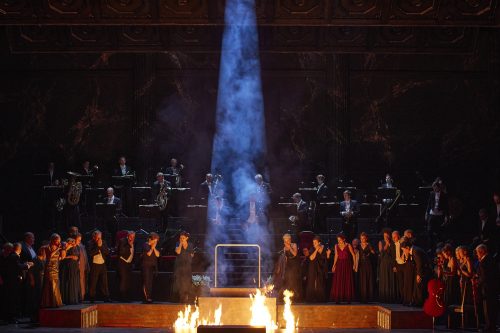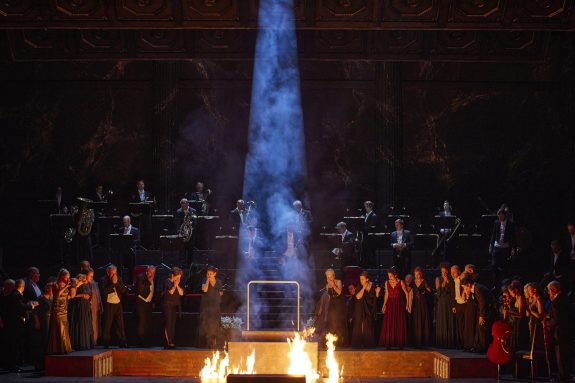 Germany Verdi, Don Carlo: Soloists, Sächsische Staatsopernchor, Sächsische Staatskapelle Dresden / Jordi Bernàcer (conductor). Semperoper, Dresden, 18.5.2024. (MC)
Germany Verdi, Don Carlo: Soloists, Sächsische Staatsopernchor, Sächsische Staatskapelle Dresden / Jordi Bernàcer (conductor). Semperoper, Dresden, 18.5.2024. (MC)

Bulgarian-German director Vera Nemirova and her design team were responsible for this original Don Carlo, a co-production with the Salzburg Easter Festival, premiered in 2020 and introduced at Staatsoper Dresden in 2021.
In response to a prestigious commission from the Paris Opéra, Verdi in 1867 completed Don Carlos, a five-act grand opera to a French libretto, a project similar to those that proved so successful for Meyerbeer and Halévy. For his libretto Verdi looked to Joseph Méry and Camille du Locle who based their libretto on Schiller’s dramatic poem with smaller sections based on a Eugène Cormon drama. At rehearsals for its premiere in Paris Don Carlos was deemed too lengthy to be practical for audiences and alterations including cuts had been required. Later Verdi subjected Don Carlos to numerous changes and revisions, and with its new title of Don Carlo used an Italian translation in versions for Naples (1872), Milan (1884) and Modena (1886).
For this revival of Don Carlo Nemirova and her designers adopted the four-act La Scala, Milan version of 1884 that used a libretto translated into Italian by Achilee de Lauzières and revised by Angelo Zanardini. Act I was removed and Nemirova’s production controversially incorporated additional orchestral music, namely a new prologue written by composer Manfred Trojahn. This prologue served to visualise anew the Act I Fontainebleau scene from the five-act version where Don Carlos met and became betrothed to Elisabeth against the backdrop of Spain and France being at war. There is no dialogue with Trojahn’s new orchestral prologue, and the meeting of Don Carlo and Elisabeth was represented by Altea Garrido’s choreography where two dancers wearing white costumes danced amid two rows of tall white flowers. Trojahn’s original music suited the opera being dark and mysterious of a gathering intensity. A gang of thugs assaulted the dancers and dragged them away. During Trojahn’s music, along with the pair of dancers on the stage was a simultaneous video projection on translucent material of an ominous group scene of terrified men, women and children, wearing winter clothing, seen huddled together on a wooded hillside. Another very noticeable aspect of the production was Frauke Schernau’s costumes which were of the period around the 1500s up to the interval, and thereafter a mix of contemporary clothes were worn.

In opera always sinister is an auto-da-fé scene, a public parade and burning in a woodpile of condemned heretics performed by the Spanish Inquisition an act that occurred here in front of Madrid’s Basilica of Our Lady of Atocha. Coming after the dramatic music of the auto-da-fé, Trojahn had successfully written a most affecting interlude for cello solo from one of Mendelssohn’s Song without words for solo piano. The stage was in gloom apart from a spotlit scene of a cello leaning against a chair. Playing the interlude and spotlit too in the pit was first cellist concertmaster Norbert Anger. Productions which interfere with or deviate from a composer’s intentions are not something I normally appreciate. Nevertheless, I have made an exception for this Nemirova Don Carlo as Verdi himself set a precedent by authorising several versions of the opera.
Set in the sixteenth century, Don Carlo is a tale of passion, love and devotion that functions within a tense climate. Personal feelings and beliefs count for little. State and religion take precedence and they have clashed. Stage director Nemirova has singled out the word ‘power’, this libretto is all about power, inherited power, the power of love and how knowledge is power. We are reminded by Nemirova in an interview that the rule of power is equally applicable today, such as people who have spoken out against abuses of power and sit in prison cells.
Set designs by Heike Scheele located the world of King Phillip II and Don Carlo in a monastery library with rows and rows of books from floor to ceiling and a smattering of heavy dark furniture, a visual theme sustained throughout. The king lives in, what Scheele describes as a ‘hermetic’ world, a court that is and feels closed off, apart from a chosen few. It is impossible for the monarch and his court to escape this heavily claustrophobic world. Crucial too is the dynastic rule of the first son succeeding his father as ruler. Here Don Carlo is the son of King Philip II of Spain, who is the son of Emperor Charles V and Isabella of Portugal.
It was Ivan Repušić the conductor at the first performance of this Nemirova revival, who emphasised how Don Carlo is a dark work and huge in scale, like a grand opera and compared it to Aida. Any production of Don Carlo, explains Repušić, needs six outstanding soloists able to surmount the challenges of the work, a select group that is hard to find. Well, the Staatsoper Dresden deserves credit for assembling six such talented singers.
Greek bass Alexandros Stavrakakis took the role of King Philip II who had married princess Elisabeth. Well suited to the role, Stavrakakis was in splendid form displaying his rich, low voice that was clear and carried its weight so well. The king ruled over a large empire yet felt betrayed by his wife Elisabeth, together with his brother and the ominous power of the Inquisition. Deeply troubled and angry Stavrakakis portrayed the king to often chilling effect. Sticking in my mind was the point when the overwrought King Philip II fell to his knees, a broken man.
French princess Elisabeth of Valois, although betrothed to Don Carlos, married King Philip II to form a peace treaty between Spain and France. Russian born soprano Elena Guseva clearly won the hearts of the audience. Her glorious voice together with natural stage presence resulted in a performance of the highest order. In her aria Tu che le vanità conosce Elisabeth is reflecting on her Fontainebleau meeting with Carlo. Producing a compelling level of emotion Guseva seemed to have the audience in the palm of her hand.
Romanian lyric tenor Ștefan Pop has appeared in numerous Verdi and Puccini roles and here sang the leading role of Don Carlo. Heir to the Spanish throne prince Carlo is betrothed to princess Elisabeth and is totally crestfallen when she marries his father. Throughout, the energetic Pop gave a convincing portrayal of the tormented prince. With his attractively warm voice, projected with clarity, Pop managed to capture Carlo’s hurt and vulnerability.
Rodrigo, Marquis of Posa was sung by German baritone Christoph Pohl who benefited from his strong and resilient voice with an attractive tone. Worth singling out is the friendship duet between Rodrigo and Carlo Dio, che nell’alma infondere amor that was marvellously done, as stirring as any I have heard.
The role of the Grand Inquisitor, the head of the Spanish Inquisition, is a small but crucial role, representing the power of the Catholic Church. Our Grand Inquisitor dressed from slippers to hat in red, was blind and senescent and used a walking stick. Remarkable was the bass duet between Alexandros Stavrakakis’s king and the Grand Inquisitor, sung by Ukrainian Taras Shtonda. King Philip II asked how the church would react if he should kill his son and the Grand Inquisitor responds that the Inquisition can take down any king. Stavrakakis and Shtonda were in their element in the scene, full of fear and menace.
Princess Eboli is Elisabeth’s lady in waiting at the court, a schemer who is secretly in love with Carlo. Russian mezzo-soprano Yulia Matochkina put her heart and soul into the role of Princess Eboli and in her famous aria O don fatale she revealed her rich mezzo-soprano creating considerable drama.
In the minor roles comprising Oleksandr Pushniak (Monk), Dominika Škrabalová (Tebaldo), Hyunduk Na (Lady d’Aremberg) and Joseph Dennis (Count of Lerma) the standard was pleasingly high.
A new name to me was Spanish conductor Jordi Bernàcer and his partnership with the Staatskapelle Dresden felt like a meeting of minds. This excellent Verdi performance was consistent and resilient with reserves of stamina in this long work, and I noticed plenty of fine detail from the players too. Highly dependable the Staatsopernchor demonstrated its prowess that was testament to the coaching by Jonathan Becker.
This revival of Vera Nemirova’s production of Don Carlo contained many admirable qualities together with the first-rate cast and world class orchestra. Such a compelling work, if I had the opportunity to attend this production of Don Carlo again tomorrow, I certainly would.
Michael Cookson
Production:
Stage direction – Vera Nemirova
Artistic assistance to Director – Sonja Nemirova
Set design – Heike Scheele
Costume design – Frauke Schernau
Lighting design – Fabio Antoci
Video design – rocafilm
Prologue choreography – Altea Garrido
Chorus director – Jonathan Becker
Dramaturgy – Kai Wessler
Cast:
Philip II – Alexandros Stavrakakis
Elisabeth of Valois – Elena Guseva
Don Carlo – Stefan Pop
Rodrigo, Marchese di Posa – Christoph Pohl
The Grand Inquisitor – Taras Shtonda
The Monk (Charles V) – Oleksandr Pushniak
Princess Eboli – Yulia Matochkina
Thibault – Dominika Škrabalová
Lady d’Aremberg – Hyunduk Na
The Count of Lerma – Joseph Dennis
A Voice from Heaven – Nikola Hillebrand
